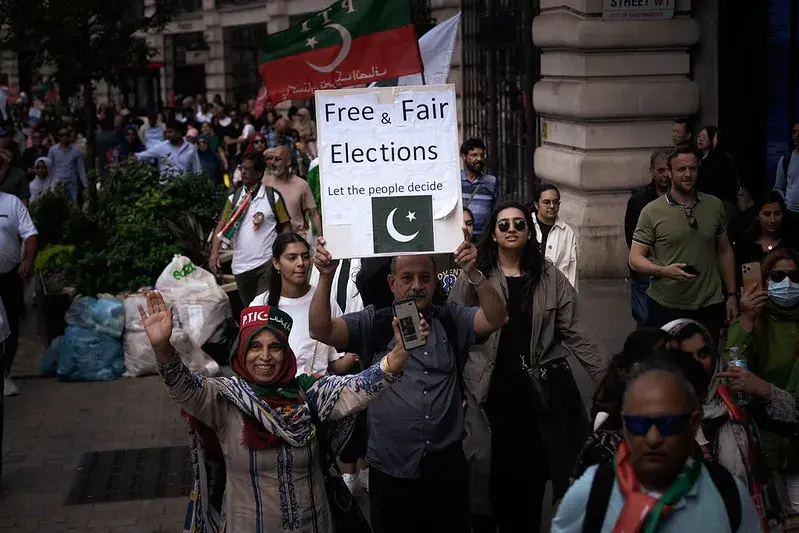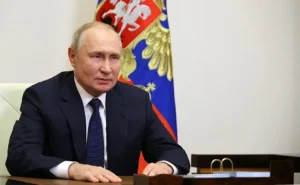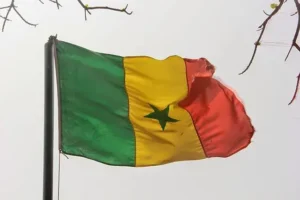Pakistanis faced a nationwide internet blackout as they voted in a highly contested election on Thursday. The government cited security concerns for the move, while activists denounced it as censorship.

As millions of Pakistanis went to cast their ballots on Thursday, the government cut off mobile internet services across the nation, citing security reasons. The election, which pits old political families against each other and a jailed former leader with a huge following, had been postponed for months.
The country of 220 million is facing multiple crises, from economic woes and militant violence, to environmental disasters that threaten its most vulnerable people.
The political situation is also volatile, as evidenced by the deadly attacks on campaign offices in Balochistan province on Wednesday, which killed 30 people and were claimed by the Islamic State Pakistan Province militant group.
Another explosion in the same region on Thursday killed two security officials and wounded seven others at a voting station.
Meanwhile, Mohsin Dawar, an ex-lawmaker, said that Taliban militants had seized control of some polling stations in Khyber Pakhtunkhwa province.
He wrote a letter to the Election Commission of Pakistan on Thursday, saying that “militants have been issuing threats to the locals and to the polling staff,” and that three women poll workers had barely escaped attacks at one station.
The Interior Ministry of Pakistan announced on Thursday that it had temporarily suspended mobile internet services nationwide. He said in a statement that this was due to the “recent incidents of terrorism in the country, precious lives have been lost, security measures are essential to maintain the law and order situation and deal with possible threats.”
Bilawal Bhutto Zardari, the leader of the Pakistan People’s Party (PPP) and a prime ministerial contender, said he had instructed his party to appeal to the Election Commission and the courts over the restrictions. He wrote on social media platform X that “mobile phone services must be restored immediately.”
Some activists criticized the authorities for censoring the internet, saying that the suspension was “political in nature” and not “mandated by the court.”
Usama Khilji, a digital rights activist from Islamabad, said that “access to the internet during elections is critical as evidence of instances of rigging can be reported live by citizens on social media, and journalists can report live.”
He added that “not having internet access can create a sense of panic for voters, and discourage some from going to vote, especially women voters for whom mobility is already an impediment.”
Pakistan also temporarily shut its border crossings with Iran and Afghanistan as a security measure, according to Foreign Ministry spokesperson Mumtaz Zahra Baloch.
In addition, political tensions are high amid allegations of meddling by the military, which it denies.
The United Nations High Commissioner for Human Rights (OHCHR), Volker Türk, called on the authorities to ensure a “fully free and fair vote” in a statement on Tuesday.
OHCHR spokesperson Liz Throssell said that “elections are an important moment to reaffirm the country’s commitment to human rights and democracy, and to ensure the right to participation of all its people, including women and minorities.”
Analysts have said that the vote is the least credible in the country’s history since independence, accusing the authorities of “pre-poll rigging” amid a broad crackdown on popular former leader Imran Khan’s Pakistan Tehreek-e-Insaf (PTI) party.
Khan, 71, a former cricket star, is still in jail on multiple charges and cannot run for office against his opponents. His PTI party is not allowed to use its well-known cricket bat symbol on the ballots, which could affect millions of voters who cannot read, and TV channels cannot air Khan’s speeches.
His old rival, Sharif, 74, a member of the influential Sharif family, is aiming for a record fourth term as leader after returning from abroad where he had fled following a corruption conviction.
Sharif enjoys strong support in Punjab province, the most populated and crucial region for the election, where his PML-N party has been praised for developing large-scale infrastructure projects.
His challenger is Bhutto Zardari, the 35-year-old son of the assassinated former leader Benazir Bhutto, who wants to revive his PPP party as a major political player.







